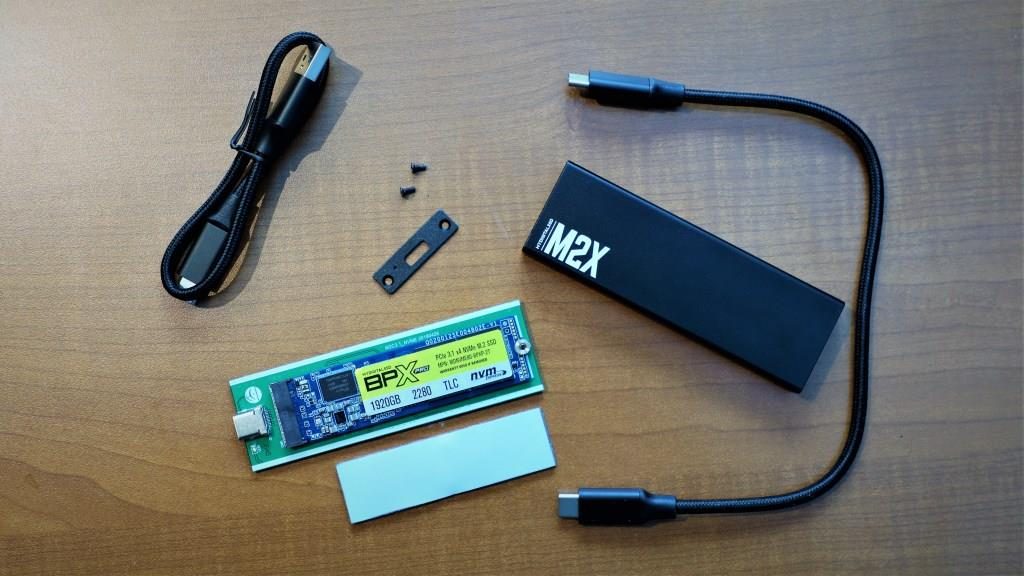Not to often that we have to eat crow (figuratively speaking) but our review today is just that. A few months ago, we reviewed the JMicron Type-C NVMe M.2 SSD to USB 3.1 Gen 2 adapter and quoted it as being ‘not quite ready for prime time.’ Simply, I was wrong. As a reviewer, we sometimes get caught up in the hype of SSD speeds and, well I just didn’t think there would be a marketplace for an adapter with 1GB/s read and write speeds, especially since I had reported on similar pushing 2.8GB/s on a few occasions prior. Our report today is on the MyDigitalSSD version of this JMicron prototype, aptly named the MyDigitalSSD M2X Type-C External M.2 SSD Enclosure.
Available on Amazon, or directly from the MyDigitalSSD website, the M2X houses a green M.2 PCB containing the JMicron JMS 583 USB 3.1 Gen 2 to PCIe Gen3 x 2 bridge controller which accommodates speeds up to 10Gbps. The exterior casing is aluminum and exterior adapters include Type-C to Type-C and Type-C to USB 3.1.
One can only achieve 10Gbps speeds with the Type-C to Type-C adapter. Also shown below the SSD in this picture is a strip of thermal adhesive which allows heat from the SSD to dissipate via the external case which is ribbed on one side. Pricing for the MyDigitalSSD M2X on the manufacturers website is very low at $36.14 and this enclosure will accommodate just about any NVMe M.2 SSD. Check out the Amazon price.
For our report today, we are going just a bit overboard, but will be testing with the MyDigitalSSD BPX Pro 2TB NVMe SSDs that we have also recently completed our evaluation on. At 3.4GB/s a second throughput and over 500K IOPS, we know that this enclosure will not even come close to maximizing performance potential, but 2TB capacity in such a small device can’t be beat.
ATTO Disk Benchmark is perhaps one of the oldest benchmarks going and is definitely the main staple for manufacturer performance specifications. ATTO uses RAW or compressible data and, for our benchmarks, we use a set length of 256mb and test both the read and write performance of various transfer sizes ranging from 0.5 to 8192kb. Manufacturers prefer this method of testing as it deals with raw (compressible) data rather than random (includes incompressible data) which, although more realistic, results in lower performance results.
 The SSD Review The Worlds Dedicated SSD Education and Review Resource |
The SSD Review The Worlds Dedicated SSD Education and Review Resource | 


What sort of SSD would you recommend for this enclosure then?
I bought laptop with quite weak m.2 SATA ssd. They seems standard, even in good laptops. It seems like a solid choice to insert that 2TB as boot drive and make laptop one external, whatever it was.
enclosure limits 1/1 so this m.2 is solid overkill
Well, this enclosure is for M2 NVME SSD. For M2 SATA SSD there are a lot of other, older and cheaper USB enclosures on market. But SATA speed limit is about 500MB/s. Usually SATA ans NVME SSD are not interchangeable in slot, and SATA SSD surely would not work in reviewed enclosure.
*I also use my old NVME SSD from my laptop in alike enclosure.
Cheapest you can find. Just be sure that it is NVME SSD. Both PCI x2 and x4 NVME SSD would work in this enclosure with equal speed. Even Intel SSD 660P should work. You can take something faster(like XPG 6000 or 6200, Kingston A1000) or even the fastest(HP 920, XPG 8200) if you plan to move it to your PC or laptop in future, but the max speed through USB 3.1 would be the same: 1GB/s.
This would also be useful for cloning an M.2 boot drive before replacing the current boot drive. I use SATA-USB enclosures for this purpose, so I’m glad this M.2 NVMe enclosure exists.